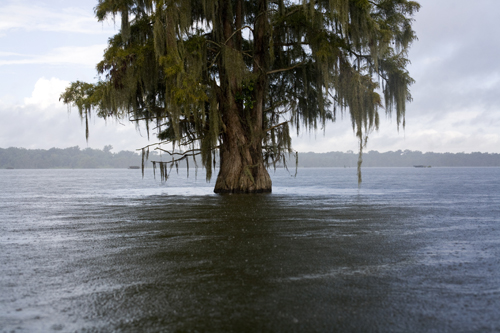 A four-hour drive from Portland to Pendleton, Oregon—on September 14, 2010—and you’d have found yourself at the 100th Anniversary of the Pendleton Round-Up. The Pendleton Round-Up is a stop on the Professional Rodeo Cowboys Association (PRCA) circuit, and easily among the oldest and largest rodeos in the world. In Pendleton, you witness what passes for Americana, today: An atmosphere of stultifying kitsch—with an undercurrent of seething anger at the government.
A four-hour drive from Portland to Pendleton, Oregon—on September 14, 2010—and you’d have found yourself at the 100th Anniversary of the Pendleton Round-Up. The Pendleton Round-Up is a stop on the Professional Rodeo Cowboys Association (PRCA) circuit, and easily among the oldest and largest rodeos in the world. In Pendleton, you witness what passes for Americana, today: An atmosphere of stultifying kitsch—with an undercurrent of seething anger at the government.
There’s real history here, with the impressive heritage of our American frontier, a place that captivated the imagination of our young country, luring wagon-riding settlers for nearly a century. Dusty yellow-grass hills. Ponderosa pines. A wide-open, unblinking blue sky. And, of course, the frontier archetype at the center of it all, the rodeo cowboy, with his various violent pastimes: Steer wrestling, saddle bronc riding, calf roping, barrel racing, wild cow milking—and more.
Yet it’s hard to look past what the rodeo has become. The Pendleton Woolen Mills will happily sell you “Let ‘er Buck,” the “Official Fragrance of the Pendleton Round-Up,” a scent that promises its clientele “notes of bergamot and mandarin.” Display windows boast t-shirts emblazoned with “The Cowgirl Militia” logo, often beside “Bling to tha’ Bone” hoodies, and any number of items of gun-themed clothing. Call the oldest merchant in town and you’re immediately routed to a recorded message. “Thanks for giving us a jingle at Hamley’s,” intones a smoky-voiced cowboy. “Listen up, while we try to head you through the right gate.”
Press 1 for the WESTERN STORE AND SADDLE SHOP, and you’re connected to an authentic-sounding employee—who lists the vast range of Pendleton Round-Up merchandise tie-ins.
“Spurs, buckles, bracelets, money clips, earrings. Basically anything you can make out of silver. Then there’s boots and hats and rifles. Pistols, too. I forgot about those. Colt 45s. I guess everybody just jumped on the Centennial train.” This includes, apparently, the local Ford dealership, which has issued a number of limited edition, “Let ‘er Buck,” F-Series pickup trucks.
The window art around town borders on the grotesque. Hamley’s is a good example: A caricature of a cowboy and a steer sit down to dinner. The steer says: “Tell me this isn’t who I think it is.” The cowboy replies: “Dig in… It’s the best in town.” T-shirts on the street veer between militant and racist: (God and Guns, Since 1776) (Waterboard Pelosi) (Give Tiger a Break, Obama is Screwing the Whole Country).
But maybe this isn’t surprising, after all. George H. Pendleton, the town’s namesake, was a prominent Copperhead—one of a group of United States Senators who, in the early 1860s, opposed the continuation of the Civil War. He ran for vice-president against Lincoln and Johnson on the Democratic ticket in’64. Pendleton supported a quick peace deal with the Confederacy, a deal that would have allowed the southern states to maintain their system of slavery. He favored limited government. In part because of this stance—the town founders chose Pendleton as their namesake. Anger at power, it seems, has always been a booming concern in Eastern Oregon.
Pendleton, the Senator, would have been astonished that you could stay at the nearby Wildhorse Casino during the 2010 Round-Up. At the Wildhorse, after a night of gambling, the “WINNER’S BREAKFAST” is a mere five dollars. The “WINNER’S BREAKFAST” consists of three pancakes with eggs and your choice of ham, sausage, or bacon. Which brings to mind the point: Do “winners” really have to choose between ham, sausage, and bacon? Surely, “winners” have all three?
Perhaps the only actual winners are the confederated tribes of the Cayuse, Umatilla, and Walla Walla, which are building a small tourist empire just to the east of town, on a stretch of flat prairie land, which—admittedly—has been theirs for nearly 11,000 years. This, then, is the picture of the American West as it enters the twenty-first century: Cowboys and Indians, inventing new versions of themselves to snare tourist dollars. Jet travel and the automobile have rendered notions of the frontier meaningless. Just south of the place where the Yakima Wars reduced indigenous peoples to displaced, endangered tribes—foreclosed strip malls now sit, ghostly and cavernous beside the ribbon of the interstate highway.
—
Pauls Toutonghi‘s second novel, Evel Knievel Days, will be published by Crown, a division of Random House, in summer of 2012. His work has appeared in The New York Times, Sports Illustrated, One Story, Zoetrope, The Boston Review, The Rumpus, The Millions, and many other places. He lives in Portland, Oregon—where he teaches at Lewis and Clark College.
Photo by Annie Agnone
